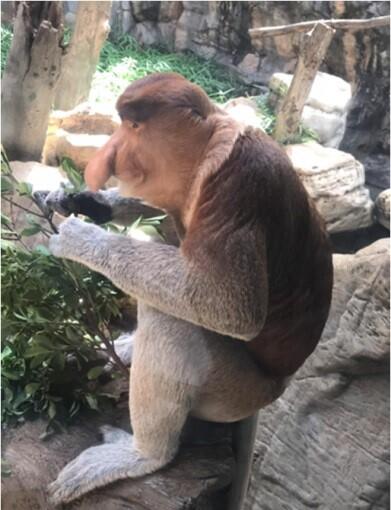A research group consisting of Sayaka Tsuchida, a senior assistant professor at College of Bioscience and Biotechnology of Chubu University and Nami Hashido, a JSPS fellow from the Chubu University Academy of Emerging Sciences, in collaboration with the Faculty of Environmental Earth Science of Hokkaido University, RIKEN Bioresources Research Center, and Yokohama Zoo, discovered a novel species of lactic acid bacteria from one of the proboscis monkeys bred in Yokohama Zoo. The novel bacterium was named "Lactobacillus nasalidis". The lactic acid bacterium was officially recognized as a new species by the International Committee on Systematics of Prokaryotes (ICSP) of the International Union of Microbiological Societies (IUMS). Details of this bacterium were published in their official Journal Intestinal Journal of Systematic and Evolutionanry Microbiology (IJSEM).
Proboscis monkeys have large pot-bellies and long noses
Four sacculated stomachs (chambered stomachs) of which the first, called the foregut, is the largest make the monkey potbellied. In the foregut, pH of the contents is regulated to the neutral at around pH 7, and hence harbor a wide variety of gut bacteria. Proboscis monkeys use these symbiotic gut bacteria to ferment undigestible plant fiber to generate energy for the host in form of short chain fatty acids (foregut fermentation). In addition, symbiotic gut bacteria decomposed the substances toxic and harmful to the digenstion, which also helps the proboscis monkey. In this study, biochemical analyses revealed high ability of this novel bacterium to degrade various sugers in the natural diet of proboscis monkeys.

(Provided by Chubu University)
Since the previously completed meta 16S rRNA analyses on the foregut contents from wild proboscis monkeys in Malaysia suggested the presence of this lactic acid bacterium, it is beleaved that this "Lactobacillus nasalidis" has adapted to the foregut environment of proboscis monkeys regardless of whether they are bred in captivity or live in the wild. Due to the specific digestive system of proboscis monkeys, it is exceedingly difficult to breed and raise them. For this reason, in Japan, they are bred only in Yokohama Zoo. With such a high ability of decomposition of plant materials, this novel lactic acid bacterium greatly contributes to the digestion and absorption of food of proboscis monkeys. It is speculated that this bacterium works as an essential ability of proboscis monkeys.
This article has been translated by JST with permission from The Science News Ltd.(https://sci-news.co.jp/). Unauthorized reproduction of the article and photographs is prohibited.




